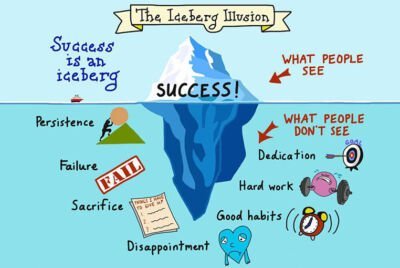by Michelle
Share
by Michelle
Share

You’ve got the fancy website, the Instagram grid that would make design influencers weep with joy, and you’ve memorized more marketing strategies than should be legally allowed. Yet somehow, the book sales aren’t exactly setting the world on fire.
Most experts will tell you all about strategies and tips to get book sales and be successful as an author, but rarely do they talk about the root causes of success. The term “Cause Blindness”, coined by behavior expert and bestselling author Chase Hughes, is when we completely ignore the causes of wealth, health, or other grand outcomes.
While watching his video, I realized this was something that could apply to authors too. Because we are all guilty of wanting quick fixes and easy strategies to succeed, but rarely do we take the time to consider that success is rooted in something much bigger and requires a lot more effort than a simple strategy or quick win.
What the Heck is “Cause Blindness”?
Cause Blindness happens when we get so fixated on the symptoms of success that we completely lose sight of what actually causes that success. We see the shiny outcomes we want and focus all our energy there, while ignoring the genuine work that creates those outcomes.
Authors want the bestselling book without acknowledging the years of craft development, audience building, and marketing education that made it possible. Or fixating on another author’s speaking tour while overlooking the decade they spent developing unique expertise that made people want to hear them speak.
Here’s a colorful way to think about it: Imagine someone buying expensive chef’s knives, premium ingredients, and fancy plating tools, thinking these accessories will make them a master chef. But they never practice basic cooking techniques or develop their palate! The tools are just accessories to cooking skill—they’re the result of expertise, not the cause of it.
In the same way, a story of “author success” doesn’t happen by mimicking the external trappings of famous writers. Their success is a byproduct of something much deeper—it comes from the inside out, not the outside in.
We’ve all seen the iceberg image floating around the nether regions of social media. This is exactly what cause blindness is: seeing that someone has success without acknowledging that it took a great deal of dedication, hard work, good habits, disappointment, sacrifice, and many other things to get there.

Photo Credit: Sylvia Duckworth
Cause Blindness & Author Success
Let’s take a peek at how this might show up for non-fiction authors who want to be successful at self-publishing.
- The Social Media Trap: We obsess over follower counts and engagement rates (symptoms of influence) while neglecting to develop the deep expertise and unique perspective that actually creates that influence. We don’t want to put the effort in to build deep, authentic relationships but focus on the easy strategies instead.
- The Cover Design Obsession: We spend weeks agonizing over font choices and color schemes, convinced that the perfect cover will sell our book. Meanwhile, we rush through the content development that creates a message that resonates with our readers who might recommend it to others.
- The Platform Panic: We stress about not having enough newsletter subscribers or podcast downloads (symptoms of authority), but skip the hard work of actually becoming a genuine expert in our field through research, practice, and developing original insights.
The Confidence Connection
This mindset trap extends to how we approach our author presence too. Many of us focus on mimicking the external behaviors of confident authors—their speaking patterns, how they carry themselves in interviews, their social media swagger—believing that if we nail these “symptoms” of confidence, we’ll magically become confident ourselves.
But authentic confidence doesn’t come from perfecting your Zoom background or crafting the perfect author bio. It comes from knowing your stuff, delivering consistent value to your readers, and surviving enough hard-fought battles to know you can handle whatever comes next.

Breaking Free of Cause Blindness
So how do we cure this creative myopia? Here are my down-to-earth suggestions for true author success:
- Flip your focus: For every “symptom” goal you set (like “get 5,000 Instagram followers”), create a corresponding “cause” goal (“develop and share 50 genuinely helpful insights about my book’s topic”). Think: What root causes will generate this success?
- Track the invisible work: Start celebrating the unsexy behind-the-scenes effort—the research hours, the draft revisions, the learning curves—not just the public wins.
- Question the quick fixes: When someone promises you overnight author success, ask yourself: “Am I being sold a symptom without a realistic path to create the cause?” Only a small amount of products actually teach you to be successful.
- Think in terms of byproducts: Instead of setting traditional goals (“I want to be a bestseller”), ask yourself: “What byproducts do I want to happen in my life?” Then determine the causes that will make those byproducts happen naturally. For instance, wanting your book to open up opportunities for speaking engagements or authoring a framework that will be used for years to come.
- Value the journey: Struggles, setbacks, and small victories along the way aren’t just steps to author success—they’re the actual ingredients.
The Truth About Author Success
Here’s the empathetic truth from one author to another: There are no shortcuts to creating a soul-aligned author business. The cause of genuine success is showing up consistently with value, connecting authentically with readers who need your message, and focusing on making an impact rather than just making a splash.
And here’s something to remember when you’re looking at the “news” in publishing or what the “experts” are telling you to focus on—they’re often pointing to symptoms, not causes. When someone tells you that you absolutely must be on the latest social platform or using a particular marketing technique, ask yourself: “Is this addressing a symptom or a cause?”
Most of our society has been trained to focus on symptoms while ignoring causes.
The good news? When you shift your focus from chasing symptoms to creating causes, not only do the results eventually follow—but the journey becomes a lot more meaningful.
A New Way to Set Author Goals
Try this approach: Instead of setting traditional goals (“hit the Amazon top 100”), identify the meaningful outcomes you want from your author career (“create work that genuinely helps readers solve problems,” “build sustainable income from my expertise,” “establish credibility in my field”).
Then, work backward (reverse engineer) to determine what causes would naturally produce those outcomes. Things like:
- Developing genuine expertise in your subject matter
- Creating truly valuable content that solves real problems
- Building authentic relationships with readers who need your message
- Mastering your craft through consistent practice and improvement
When you focus on these causes, the symptoms (book sales, followers, recognition) tend to follow as natural byproducts—and in a soul-aligned, nurturing way. In fact, this way of thinking about your author brand can be a wonderful shift from chasing algorithms and “going viral” to living in a way that feels good to your mental health and wellbeing. Instead of focusing so much on author success, we focus instead on those step-by-step causes that get us there.
Our journey is in the messy middle, and it’s where we learn the most about ourselves, our audience, and our business. Skipping that middle part is robbing yourself of the journey and all opportunities for learning along the way that lead to author success. Avoid being blind to the causes and you’ll reap the benefits of not only publishing your book but also the growth that comes with it.
Sadly, most people are not patient enough to reap the fruits of their own labor. Great teams gain their strength and resilience while toiling their way through the valleys, not just from relishing the view from the peaks….Sustained patience and persistence can be such an amazing competitive advantage. Progress takes time, even when you have the very best strategy, people, and resources at your disposal. – Scott Belsky, Author of The Messy Middle
Tell the Trees is supported by its readers. When you make a purchase using links on this site, it may result in affiliate commission. Please visit my affiliate disclosure page for more information.
Let's Discuss It
The EU Accessibility Act officially kicked in on June 28, 2025, and that means it's being enforced right now. Here's what to expect for self-publishing.
Sometimes what we call perfectionism is just fear of rejection in disguise. We keep our work hidden because putting it out there means people can judge it.
Ever wonder why some books take off with book sales while others collect digital dust? When it comes to book marketing, I’ve noticed the same problems pop up again and again. Let me walk you through a real example that perfectly illustrates what NOT to do—and more importantly, how to fix it. The Post &
D2D for print books will not replace Amazon KDP for most authors—the royalty difference is just too significant if you're primarily selling direct to consumers online. But it's not supposed to replace Amazon; it's supposed to complement it.








